Michael Pollan's Cooked: Review & Giveaway
There’s been quite the whirlwind of controversy around the time of Michael Pollan’s release of his latest book, Cooked (and much of it surrounding the book’s precursor, an article he wrote for the NYT Magazine surrounding the Julie & Julia film release). I’m pleased to share the book with you so you can make your own decision.
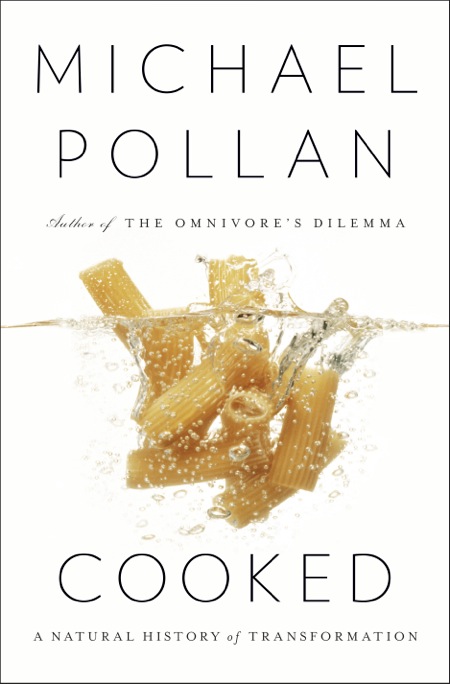
Anyone telling us (as a society, not just women) that getting back in the kitchen is worthwhile for a number of reasons is bound to go over rockily. The food industry’s contrived centrality of our dependence on convenience, big ag’s guiding model of lots of cheap and unsustainable food and our busy consumer lives don’t jive with taking time away from all that. It’s swimming upstream when many facets of our society tell us and reinforce the idea that we maximize efficiency to leave the cooking to people who do it well and focus on earning money so we can afford it. I really enjoyed Michael Pollan’s discussion of the division of labor and specialization in a complex economy in his introduction to Cooked. He arrives at the not ominous, nor badgering, prescription of cooking, “Not every day, not every meal—but more often than we do, whenever we can.”
When researching for my first book, I came across Stephanie Coontz’s book The Way We Never Were: American Families and the Nostalgia Trap and Laura Shapiro’s Something from the Oven: Reinventing Dinner in 1950’s America. These two books are a great way to preface opinions you might form about the decline of ‘traditional’ structures and why we eat the way we do today, respectively. I think it’s easy to believe others’ breakdown of the complexities surrounding food, gender and socioeconomic disparity, but I hope more of us will take some time to understand some of the less-discussed factors behind the controversy of cooking. The call to try to eat more food cooked at home (and from identifiable ingredients) has been called unfeminist, nostalgic or elitist all of which frankly misses the point. Eating is central to our well-being and it isn’t optional; eating things our bodies recognize as food is one of the best things we can do to be successful in all our other human pursuits. Cooking things ourselves (more than we do now, at least) is the best form of diet and weight-control.
I see the desire to bring people (not just women) back together, back to the table, back to the cutting board, for what it is, the desire to reconnect in our highly-specialized, multi-tasking, disjointed society, not the desire to return society to the 1950’s. It’s too easy to generalize and make certain sentences (taken out of context) into an argument supporting just the opposite. Feminists leaving the duty of the kitchen behind (not necessarily the kitchen itself) is not the cause of where we stand with food today and nowhere in Michael Pollan’s oeuvre do I glean him blaming Betty Friedan or the numerous others involved in liberating women from the 1950’s-era obligation to cook. I see a lot of different looks to feminism, especially how women relate to those many faces of it today. (This subject, of recent internet storm surrounding an excerpt on Salon of Emily Matchar’s new book, is something I will discuss separately. I have a lot to say about that excerpt and the book it came from.)
I appreciate Pollan’s revisit in Cooked to the 2009 NYT Magazine piece and find the book substantiates the food industry’s responsibility for killing cooking, and does not blame ‘some American feminists’. Moreover it shoves gender aside to look at the other factors in modern life that are consuming our cooking time, time spent driving and waiting for takeout, commuting, watching TV, surfing the internet, eating more (while doing other things).
Regardless of who actually did the bulk of the cooking in earlier eras (hired help or people who couldn’t afford to hire help) we find ourselves in a similar predicament in modern times, pay someone to make food for us or learn to make it ourselves. Michael Pollan isn’t telling us we don’t have a choice between these two options. He’s noting here (and primarily in In Defense of Food) that cheap food isn’t just a bargain, but we’re also getting more than we probably bargained for (additives, sub-par ingredients, farming practices that don’t do our bodies or the planet any favors, etc.).
I don’t know how to solve the complex problem of food insecurity for the masses of people who don’t have enough money to even purchase enough cheap food to feed their families or who don’t have any alternatives beyond the cheap food in the mainstream grocery store; I do know that Michael Pollan’s Cooked isn’t a prescription for solving that problem. (That’s not to say it’s not a worthwhile question, just not the question Michael Pollan is approaching here.) That one writes a book about changing the eating habits of the majority of people who are above the federal poverty level and how it often gets pegged as inapplicable to the severely impoverished is confounding to me. This book is not an elitist approach to food, but rather it’s a critical look at the myths (that scratch cooking is hard and inconvenient, that better-for-you, better-for-the-planet food is cost prohibitive, that we must default to cheap food rather than change other purchasing behaviors) associated with food. I’ll go out on a limb and guess that Pollan’s intended audience is people who have enough money to buy a book (or the ingenuity to check it out from the library) and who have one job (not three) and a little time to work with around dinnertime or on weekends. To expect one book to solve all of society’s food political ills is unreasonable, to admonish it as elitist is not taking into account all the other choices we make daily as consumers and time managers.
Cooked is a series of four vignettes based on the transformations we perform in the kitchen based on the four classical elements: Fire, Water, Air and Earth. It’s heady and Pollan-esque, which is why I love it. He references Harold McGee and Sandor Katz, who I adore, among many others with whom he worked in the various sections; this book is like the opportunity to sit next to these folks at a dinner party and hear all about the history and science of preparing food. I enjoyed hearing Michael Pollan talk about the book on an NPR interview, and a comment about how we make time for things that are important to us really resonated with me.
The one thing I’ve come to understand about cooking (in the writing of my own kitchen book, due out next spring) is that each of us approaches it differently. I’m new to the sustenance cooking realm (moving beyond just special projects like bread, ice cream and pickles) and I liked Pollan’s prescription for his predicament of having only about a half hour to work with in the evenings for supper, the weekend cooking plan and a few mise en place (dicing those pesky onions) make aheads for the week. Furthermore, what inspires me might irritate you. If you’re into Pollan already, you’ll likely enjoy this book. If you’re looking for a how-to-cook nuts and bolts, mostly-recipes book, this isn’t likely a fit. However you come to the kitchen and with whatever attitude you have toward it, taking little steps to extricate ourselves from big ag, the profit margins of the food industry has so many benefits. The roles and implications are up to you; having discussions about whose job it is on certain nights, forming cooking groups (for single peeps) or pegging ourselves with guilt is up to us. I like Pollan’s approach in this book primarily because it jives with my personal m.o.: do what works for you and be open to trying new things.
Enter officially by leaving a comment: one little (or big) thing you are intriged by in the kitchen as of late. Entries must be received by Thursday, May 23 at midnight CDT. Since I’m mailling the book to the winner myself (no publisher shipping restrictions), I’ll open up the giveaway to anywhere in the world.
Disclosures: There are Amazon affiliate links from which I may make a small commission. The review copy and book giveaway prize are provided courtesy of The Penguin Press. Opinions and statements are my own.
 Kate
Kate
Congrats to lucky number 34, Kristin in Fort Worth!

Thank you all for reading and entering with such thoughtful intrigues in your kitchen.
 Giveaways,
Giveaways,  Healthy Living,
Healthy Living,  Kitchen,
Kitchen,  Traditions,
Traditions,  Why Homemaking?
Why Homemaking? 
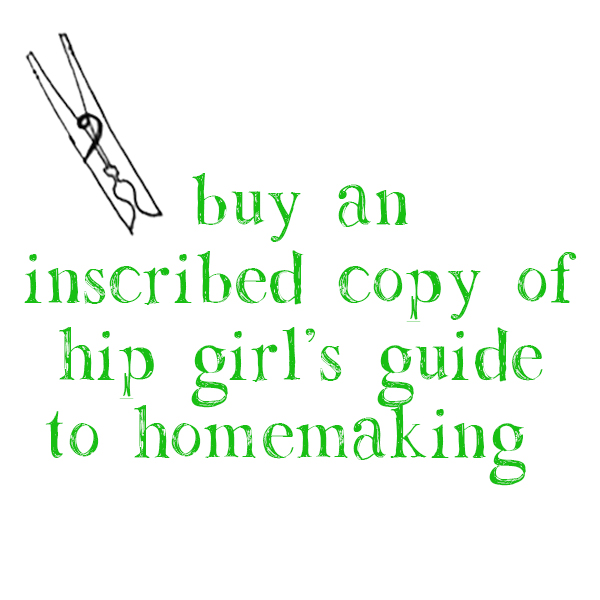
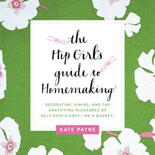
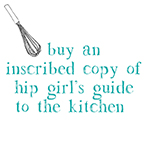
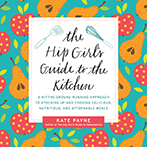

Reader Comments (73)
I am intrigued by how many tasty meals I can make for my family out of one chicken from the farmers market!
I'm thinking a lot about beets. Are there different varieties, how do you peel them, and how do you make Harvard beets? Besides that, I've been thinking about the idea of the "New Domesticity," and trying to square it with my experience. I wondered if it really is a new idea or if we are getting a closer handle on what it means for women (and men)to lead balanced lives. Five generations of women worked in my family. They were employed in textile mills, in ammunitions factories, as barmaids and waitresses, and finally in professional work as a college professor--many times working long hours for low pay (I'm talking about the professor here for certain!). But the grandmothers and mothers in every one of these five generations, raised children, grew gardens, cooked homemade meals, and knitted for our friends having babies. So, is the New Domesticity a nostalgic longing for the past or are we seeing some sort of evolution of our family and home lives? I don't know the answer, this is just what I'm intrigued by when I'm thinking about the kitchen.
I'm always looking for new stuff to make. This week, it's fermented ginger beer.
I'm intrigued by sprouted grains lately.
Thanks for the giveaway!
I have been very interested in fermentation due to your recent talk at the Austin Organic Gardeners meeting :) I can't wait to start fermenting my garden harvests! Thank you for your insight.
I am intrigued these days by making cheese...just learning!
After reading your recent post on vinegar that is what I am intrigued by. There is a strawberry batch brewing right now!
I've been intrigued by pressure canning. I am an avid jam and pickle maker but I'd like to can low acid/low sugar items. I think this might be the year finally purchase a pressure canner.
I'm intriged by the art and science of preserving food grown in my own garden.
I have been intrigues by a sourdough starter and thinking of getting one to try my hand at it :)
I realized last night that when I am cooking/working in the kitchen is the only time i don't feel compelled to check my email/twitter/Facebook. I am intrigued by how centered and connected I feel while cooking.
I'm intrigued by learning how to make many things I used to buy pre-made (bread, yogurt, tomato sauce, etc) from scratch. ..... Oh, and I'm also intrigued by my pressure cooker. I can't believe all of the wonderful things I can make in it in half the time!
I am currently intrigued with all forms of Food Preservation!
I am amazed that food is the way to everyone's heart: woman, man, child, animal... REAL food is so far gone from the mouths of my community that when I make the slightest effort to introduce some scrumptious new flavor or share some lovely nibble from my garden or some home concocted bit of divinity, the heart of the receiver open ups in a warm embrace for me, the gifter. Real food is Love.
I have recently become pescetarian and cut down on dairy, on my way to going Vegan. Finding delicious foods with enough flavor, protein and nutrients is an ongoing experiment I am finding challenging, exciting and satisfying.
Hi Kate! Really hope I win this one. We just a mandolin, so interests include all things thinly sliced and julienned. Trying to stay out if the ER too. Those things are sharp!
Lately, I have been making water kefir and flavoring it with various fruit flavors such as passion fruit or honeydew melon.
I ordered some water kefir grains a few weeks ago, and they finally arrived! I have them multiplying right now in some sugar water. I'm anxious to try some homemade gingerale, and see what other bubbly concoctions I can come up with using the grains with fruit syrups I canned over the summer. I'm going to tackle milk kefir next! Can't wait. I love little science experiments in my kitchen. Hence the saurkraut I had fermenting on my counter for weeks that perplexed my husband...
I'm now grain and sugar free completely, I've been having so much fun creating grain free baked goods and delicious meals, next up, jam made with honey and/ or just fruit juice, with no added pectin, hopefully!
I'm intrigued by my Food Saver. Mostly by my inability to use it with juicy things.
Sprouting my own sprouts! Good for salads, good with feta and balsamic. Green peas, lentils. I tried chickpeas but couldn't make them sprout right.
After a visit to Lupicia in San Francisco, I'm reinvestigating varieties of black tea and their best steeping times. Varied amounts of time, varied amounts of tea, and varied temperatures of water seem to work out best depending on the tea's age and type. It's a great excuse to have just one more cuppa...
Lately I've been intrigued with using spelt flour and other different grains. New textures to my baking!